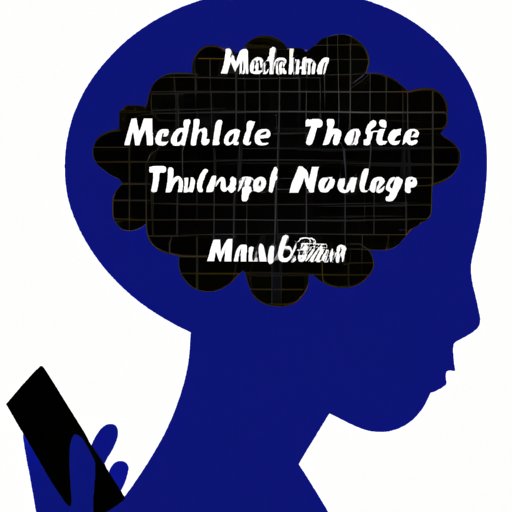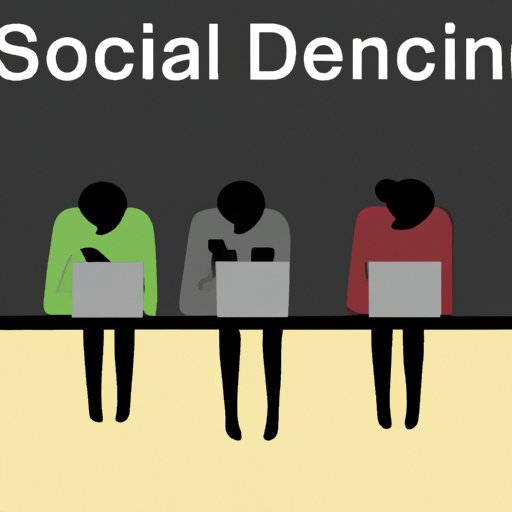Introduction
Since its inception, technology has had a profound effect on society. From the dawn of the Industrial Revolution to the advent of the information age, technology has drastically changed the way we live our lives. While there are many benefits to technology, it also has some drawbacks that can have a negative impact on society. This article will explore why technology can be bad for society, with a focus on mental health, social isolation, data privacy, digital addiction, and critical thinking.

The Impact of Technology on Mental Health
Technology has been linked to an increase in anxiety and depression. According to a study by the University of Pittsburgh, social media use is associated with increased levels of anxiety and depression in young adults. The study found that those who used social media most often had 2.7 times the odds of having high levels of anxiety and depression than those who used it least often. Additionally, the constant distraction of technology can lead to an inability to focus or concentrate on important tasks, both at work and in school.
Moreover, technology can have a detrimental effect on relationships. Constant connection to technology can lead to a lack of face-to-face interaction, which can lead to feelings of loneliness and isolation. Furthermore, the prevalence of cyberbullying has become a major issue, with nearly half of all teens reporting they have been the victim of cyberbullying in some form.

Social Isolation and the Digital Divide
The rise of technology has led to a decline in face-to-face interactions, which can lead to feelings of loneliness and isolation. According to a study by the American Psychological Association, people who interact more often through technology report feeling less connected to their friends and family. Additionally, the “digital divide” between those who have access to technology and those who do not can contribute to a widening gap between the connected and unconnected.
The digital divide can lead to a loss of community, as those without access to technology are unable to participate in online conversations and activities. This can lead to a lack of understanding of current events and a disconnect from the rest of society. In addition, those without access to technology may find it difficult to find employment or educational opportunities, further widening the gap between the connected and unconnected.
Data Privacy and Security Concerns
The rapid advancement of technology has led to a number of data privacy and security concerns. With the rise of the internet, businesses and governments have access to vast amounts of personal data, leading to an increased risk of data breaches and hacking. Additionally, the potential for surveillance and tracking has become a major concern for privacy advocates, as companies such as Google and Facebook have access to a large amount of personal data.
Furthermore, the growing fear of government involvement in data collection has led to a heightened awareness of data privacy and security. As technology continues to advance, it is becoming increasingly important for individuals to be aware of their data privacy rights and how to protect themselves from data breaches and hacking.
The Dangers of Digital Addiction
Technology can also be addictive, leading to a decrease in physical activity and an increase in sedentary behavior. According to a study by the World Health Organization, more than 1 billion people worldwide are addicted to technology, including smartphones, tablets, and video games. Additionally, research has shown that technology can be just as addictive as drugs or alcohol, leading to difficulty disconnecting from devices and spending too much time online.
Furthermore, the overuse of technology can lead to a decrease in physical activity, which can have a negative impact on overall health. Additionally, research has shown that too much screen time can lead to sleep disturbances, decreased concentration, and impaired academic performance.

The Decline of Critical Thinking Skills
Finally, technology can lead to a decline in critical thinking skills. With the rise of the internet, people are increasingly relying on technology for answers, leading to a decrease in problem-solving abilities. According to a study by Stanford University, students who rely on technology for answers are less likely to develop the skills necessary to think critically and solve complex problems.
In addition, technology can lead to a lack of empathy and understanding. Constant connection to technology can lead to a decrease in emotional intelligence and an inability to understand the feelings of others. Research has also shown that technology can lead to a decrease in creative thinking, as people become reliant on technology for ideas and solutions.
Conclusion
In conclusion, technology can have a negative impact on society, from mental health issues to data privacy and security concerns. The rise of technology has been linked to an increase in anxiety and depression, as well as a decline in face-to-face interactions and community. Additionally, technology can be addictive, leading to a decrease in physical activity and an increase in sedentary behavior. Finally, technology can lead to a decline in critical thinking skills, a lack of empathy and understanding, and an inability to solve complex problems.
It is important to recognize the potential dangers of technology and take steps to mitigate them. This includes setting boundaries around the use of technology, limiting screen time, and encouraging face-to-face interaction. Additionally, individuals should take steps to protect their data privacy and security, such as using strong passwords and being mindful of what they share online. Finally, it is important to foster critical thinking skills and encourage creative problem-solving.
(Note: Is this article not meeting your expectations? Do you have knowledge or insights to share? Unlock new opportunities and expand your reach by joining our authors team. Click Registration to join us and share your expertise with our readers.)
